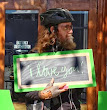


By sunrise, Albert’s panniers were secured to his racks filled with the essentials for the journey ahead – bread, bananas, apples, peanut butter, and his favorite tea-time treat, his mother’s home made Eccles cakes. With water bottles filled, tool-kit and replacement tire tubes stashed, his faithful iphone pocketed and his old soul of a Mother’s guiding words of wisdom (“fuel up, drink lots of water and mind the sun”) in mind, he was set. So with a parting hug and a wave goodbye he headed out from his familiar East Vancouver neighborhood and headed south for the U.S./Canadian border.
Albert could feel his pre-ride jitters immediately leave as his sturdy, shiny and black, handmade ‘Rock Lobster’ Path Racer bicycle rolled across Granville Street bridge and down route 99. Streaming behind, tied firmly around his seat-post was the orange yarn. With a slight northern breeze on his back and the bright morning sun reflecting off of his hammered Japanese mud-guards, he thought of his mother’s question of, “why now?” and of his response, “the time felt right, weather conditions were (mostly) favorable this time of year, and that it was May, the month of the year honoring the bicycle.”
As Albert departed border control, he thought about what the officer had told him in regards to the fruits that he had to declare. That during the officer’s “lecture” he realized how limited his knowledge of the world of produce and farming was, and made a commitment to himself that during the days ahead he would take the time to garner greater awareness about the foods that had sustained him in his young years, foods that he had taken for granted.
Liberated, Albert pedalled south along rolling country lanes, through farmland with golden meadows and green pastures dotted with cows, sheep, and goats. This, he now realized, was where food – dairy and vegetables - were grown and produced. He was experiencing new smells for the first time and he liked them. Organic smells, the smells of nature. He felt alive, his senses were tingling and it wasn’t until a sweaty garbage truck passed him that he was reminded of the neighborhood and city in which he was raised. With the glistening Straight of Georgia, with its cargo tankers and sailing boats off to the west, Mount Baker and the snow capped Cascade mountain range to the east, he rode on. He passed locations with names like Sunset Farm and Rio Ranch, crossed over Silver Creek and Red River, witnessed aged and peeling red barns surrounded by flowering Tulips, vintage rusty tractors embedded in wildly overgrown lawns (no neat little chemically treated manicured suburban lawns here), and an abundance of colorfully ripening fruit orchards.
Early afternoon Albert stopped to rest-up and re-fuel. He pulled into the port town of Bellingham where his attention had been caught by a sign announcing an art exhibit at a small beer brewery. A local artist had created sculpture from old discarded appliances: radiators and heaters, stoves and iceboxes, duct pipes and spare metal parts. The artist had recycled the appliances, creating a fascinating array of characters: robots and spiders, pigs and grasshoppers. Recycling was something that Albert’s mother felt very strongly about but was yet another subject that Albert new little of and needed to explore. He knew from the moment he saw it that the idea of creating art through recycling was simply wonderful.
Leaving Bellingham along Chuckanut Drive, the road rose up and wound along Bellingham Bay and Albert, through a wall of pine trees, caught momentary glimpses of the sparkling bay and its resident kite-boarders below. Chuckanut Drive, was his first mild climb and descent – a minor thrill. Mid-afternoon, Albert enjoyed sampling tea at a roadside Japanese Tea House and by late afternoon had reached the Deception Pass bridge that carried him over to Whidbey Island. It was here, after 80 miles of cycling that the orange yarn tied to the seat-post of his bike pulled taut. Albert was then reminded of his mother’s one-condition – “...this ball of yarn shall determine the length of your adventure.”
Off in the distance, a short way down the road, Albert noticed a local campground. After making camp and settling in for the night, Albert had time to reflect on his day, a day that he had so enjoyed. “And what now?” he said to himself, the last thing he wanted was for the adventure to end after just one day. But what of his mother’s condition? He then remembered something his mother had once told him, that, “ a person’s life experiences are only limited by one’s own imagination.” With this thought Albert knew what he had to do...Albert had to find more yarn!

No comments:
Post a Comment